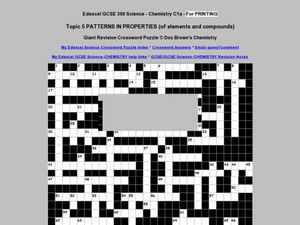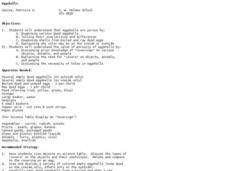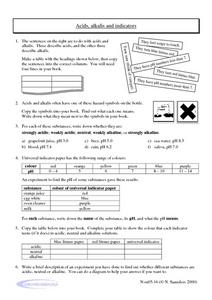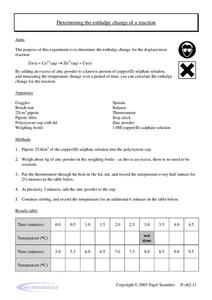Curated OER
Ester Lab
In this ester activity, students mix organic acids with alcohols to produced esters and identify the products by the chemical reaction and the scent given off after the reaction occurs.
Curated OER
Physical and Chemical Changes
Young scholars investigate chemical and physical changes. In this physical and chemical change lesson plan, students perform 3 experiments in the lab to observe changes in matter. They determine that no new substances are formed in...
Curated OER
Crystal Painting
Students investigate crystalline solids. In this crystals lesson, students observe samples of natural crystals and compare and contrast each. They draw pictures with crayons and then paint over their picture using crystalline solids...
Curated OER
Pesticides
Young scholars investigate the uses of pesticides and the pros and cons of their use. In this pesticides lesson plan, students observe simulations of the three classes of pesticides and the effects or actions each has. Young scholars...
Curated OER
Energy Changes, Rates of Reactions, Nuclear Chemistry
In this energy changes, rates of reactions and nuclear chemistry worksheet, students solve 14 problems to review concepts about endothermic and exothermic reactions, heat of combustion, heat of reactions, enthalpy, kinetic and potential...
Curated OER
Ohm's Law
In this Ohm's Law worksheet, students answer 16 questions about electricity, electric current, voltage and electricity and they mathematically analyze a circuit they design and construct.
Curated OER
Interactive Notes-"Electricity"
Young scholars explore electricity. In this interactive electricity lesson, students create static electricity with balloons, observe the rate at which ice melts to identify conductors and insulators, and create a static...
Curated OER
Swimming With the Crabs
In this expository writing worksheet, students read an article about crabs and a graphic organizer with crab facts. Students fill in a graphic organizer, including their specific topic about crabs and details to support their topic.
Curated OER
Patterns in Properties (of elements and compounds)
In this element properties learning exercise, students complete a crossword puzzle with 91 questions related to properties of elements and compounds.
Curated OER
Nonmetals
High schoolers research about the chemical processes involved in cave formation. In this chemistry lesson, students draw or find a cave picture with stalagmites and stalactites online. They write a brief caption and share them with the...
Curated OER
Discovering the Wetlands!
Students name wetland plant and animal life. In this ecosystem lesson students go birdwatching and interpret native plants through art.
Curated OER
Needs of Living Things
Students discuss and explore the needs of living things. They choose to create a slide show with captions, create a web showing the needs of one Organism using KidPix. or make picture book by hand or using Microsoft Publisher.
Curated OER
Understanding: Flight
Students review the principles of flight before performing a series of simple experiments. Working in small groups, they complete hands-on activities that demonstrate the principles that make it possible for an airplane to lift into air...
Curated OER
Esters as Food Flavorings
High schoolers produce esters in the laboratory by combining different carboxylic acids with different alcohol. In this esterification lesson plan, students experiment with 3 carboxylic acids and 3 alcohols to produce 3 esters with fruit...
Curated OER
Too Much Oxygen or Too Little?
In this oxygen worksheet, students analyze date about the oxygen levels in a river to determine the cause of the dying fish. This worksheet has 2 graphs, 12 short answer questions, and 2 graphic organizers.
Curated OER
Eggshells
Students examine the porosity of eggshells. In this eggshell properties instructional activity, students observe dyed eggs, then peel the eggs to see if the color was able to go through the shell and discuss why eggshells have pores.
Curated OER
Ionic vs. Covalent Compounds Lab
In this ionic and covalent compound learning exercise, learners investigate the properties of three unknown substances in order to determine if they are ionic or covalent compounds. They write conclusions about their results.
Curated OER
Terrific Tastebuds
Students investigate the four taste regions of the tongue. In this biology lesson, students view a diagram of a tongue and identify the four regions. Students perform a taste test with lemons, sugar, and crackers.
Curated OER
Voltage, Current, Resistance
In this voltage, current and resistance worksheet, students answer 21 questions about voltage, current and resistance. They find the current in batteries, they find the voltage in a resistor and they identify the voltage in circuits.
Creative Chemistry
Volumetric Analysis 1 to Make a Standard Solution of Sodium Carbonate
In this volumetric analysis worksheet, learners follow the given directions to prepare a standard solution of sodium carbonate. They later use the prepared solution in a laboratory practical.
Curated OER
Acids, Bases, and Buffers
In this acids and bases worksheet, students test the pH of different solutions to determine if it is basic or acidic. Students complete 7 short answer questions based on their results.
Curated OER
Meet the Plants
Students examine the difference between living and non-living things. In this living versus non-living lesson plan, students complete a KWL worksheet and a Living and Non-Living Chart. They examine a variety of plants and non-plants...
Creative Chemistry
Acids, Alkalis and Indicators
In this pH instructional activity, learners describe acids and alkalis. They also determine whether substances are strongly acidic or alkaline. To determine the pH of given substances, learners use the color of universal indicator paper....
Creative Chemistry
Determining the Enthalpy Change of a Reaction
For this enthalpy of reactions learning exercise, high schoolers use a known amount of copper (II) sulphate solution and an excess of zinc powder to calculate the reaction's enthalpy change. Students measure the temperature change...























